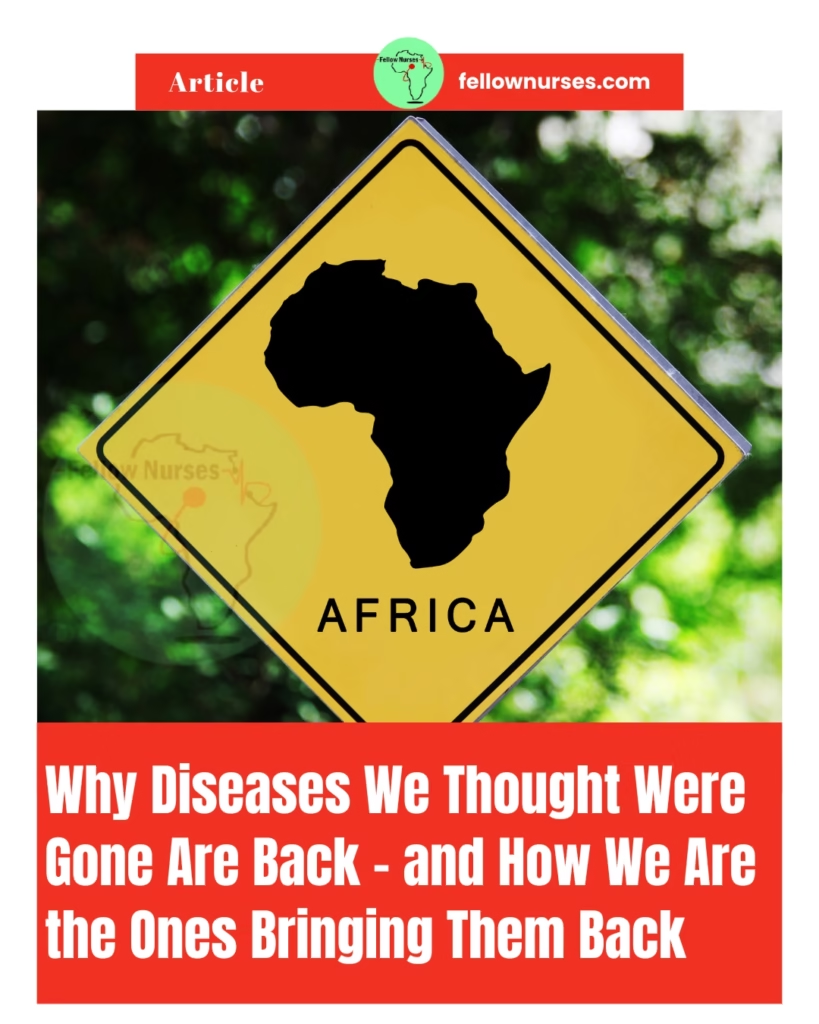Fellow Nurses Africa | Lagos, Nigeria | 23 September, 2025

Let’s take a look at some of these diseases
Malaria
Still the continent’s biggest killer among vector-borne diseases. Despite progress, malaria remains stubborn, with mosquitoes becoming resistant to insecticides and parasites adapting to drugs. Changing rainfall and rising temperatures also mean malaria is now spreading into areas once thought too dry or cool.
Dengue Fever
Once rare in Africa, dengue outbreaks are now being reported in East and West Africa. Urban overcrowding, poor waste disposal, and climate change are helping the Aedes aegypti mosquito — the same one that spreads Zika and chikungunya to expand its reach.
Chikungunya
Known for the crippling joint pain it causes, chikungunya has caused major outbreaks in East Africa in recent years. Human travel and trade make it easy for this virus to move quickly between regions, leaving health systems scrambling to catch up.
Leishmaniasis (“flesh-eating disease”)
Caused by parasites spread through sandflies, leishmaniasis leads to severe skin ulcers and, in some forms, deadly organ involvement. It remains a serious issue in Sudan, Ethiopia, and Kenya, often affecting poor and rural populations who have the least access to healthcare.
Ebola Virus Disease
Ebola is not mosquito-borne, but it remains one of Africa’s most feared infections. Outbreaks in Central and West Africa have shown how deforestation and close contact with wildlife can trigger new waves. Quick detection and community trust are vital, but both are still fragile in many places.
Marburg Virus Disease
Similar to Ebola, Marburg outbreaks have been recorded in Uganda, Ghana, and Tanzania. Its high fatality rate and sudden spread make it a constant threat in regions with bat populations and limited health infrastructure.
Polio
Though nearly eradicated, polio has reemerged in some African countries due to gaps in vaccination coverage and fragile health systems. Conflict, migration, and misinformation continue to make eradication difficult.
Plague
Most people associate plague with medieval Europe, but it remains a reality in Madagascar, where flea-borne outbreaks still occur. Poverty, poor housing, and limited access to healthcare mean the disease can reappear quickly.
How We Are the Ones Bringing Them Back
Across these diseases, the pattern is the same: our daily choices often make it easier for mosquitoes, ticks, fleas, and deadly viruses to thrive. Some of the most common habits include:
-
Leaving stagnant water in buckets, tires, or flower pots ; breeding sites for mosquitoes.
-
Not covering water storage containers; giving mosquitoes direct access to clean water.
-
Poor waste disposal; attracting rodents and fleas.
-
Sleeping without insecticide-treated nets; exposing families to night-biting mosquitoes.
-
Housing with open eaves, cracks, or no window screens; easy entry points for vectors.
-
Clearing bushes without proper disposal; creating hiding spots for ticks.
-
Storing food poorly or leaving crumbs around; encouraging rats and fleas.
-
Cutting down forests or burning land for farming; bringing humans closer to bats and primates.
-
Hunting, selling, or eating bushmeat without precautions, increasing spillover risk.
-
Skipping or delaying routine vaccinations weakening community protection.
-
Overcrowded living conditions with poor sanitation, fueling urban breeding hubs.
-
Traveling across regions without preventive measures leads to carrying or catching infections.
These everyday practices may seem small, but together they shape the environment where diseases either fade away or come roaring back.
Africa is not powerless. Vaccines for polio and yellow fever work.
Foreign Aids are gradually been removed and it is now time to look inward, invest in research and peeventive healthcare.
Stronger surveillance, smarter urban planning, and climate adaptation can help.
Health is not separate from how we live. In many ways, the return of these diseases is a mirror held up to our choice.
Fellow Nurses Africa is the independent voice of African Nurses. We educate, inform and support the nursing profession










